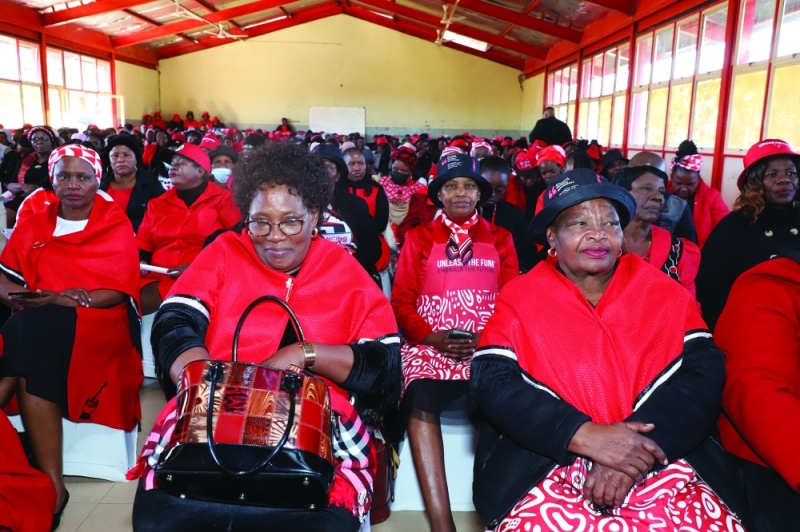The long struggle for women empowerment in the BDP
Tsaone Basimanebotlhe | Monday May 19, 2025 07:55


However, after 58 years of governance, a significant and disheartening reality remains: a persistent lack of trust in women to lead or occupy key leadership positions within the party. This deeply rooted issue was once again laid bare during the BDP’s 41st elective congress held in Maun last weekend.
The congress served as yet another reminder of the party’s continued resistance, whether implicit or overt, to fully embracing female leadership.
The outcome was disappointing, especially for those hoping that the gathering would mark a turning point.
Unfortunately, it followed a familiar pattern; women who stepped forward to contest high-level positions were overlooked in favour of their male counterparts.
This wasn't the first instance, and sadly, it may not be the last. Over the years, several trailblazing women within the former ruling party have dared to challenge this status quo.
These included prominent figures such as Margaret Nasha, Tebelelo Seretse and Pelonomi Venson-Moitoi.
They have remained unwavering in their commitment to the cause of women’s empowerment, often standing firm even when faced with systemic resistance.
Now, Dorcas Makgato has taken up the mantle, emerging as the latest in this lineage of resilient women fighting for equitable representation.
Makgato, who was contesting for BDP’s chairperson position, got 272 votes. She was the runner up to the winner Karabo Gare, who garnered 385 votes. Gare is also the Member of Parliament for Moshupa/Manyana constituency. Kefentse Mzwinila managed to get only 70 votes.
Despite the encouraging presence of female delegates at party congresses, often in large numbers, there remains an ironic contradiction.
When the moment of truth arrives, and votes are cast, women are frequently the ones who fail to support their fellow women candidates.
This internal contradiction highlights a deeper issue: the lack of confidence in women leaders, not just from men but also from within the women electorate themselves.
Historically, the few women who have managed to secure positions within the BDP's Central Committee have done so not through direct election, but rather by alternative means.
These include being co-opted as additional members or ascending to the committee by virtue of holding specific roles, such as that of the women’s chairperson, a position that grants automatic entry into the Central Committee.
Makgato’s recent experience is particularly illustrative of this ongoing struggle. After initially showing interest in running for the presidency, she eventually shifted her focus to the chairpersonship of the party.
However, even in this pursuit, her efforts were unsuccessful. Nonetheless, she has remained undeterred. Makgato views her defeat not as a failure but as a stepping stone in a broader journey, which she believes will one day see women achieving true representation at the highest levels of political leadership.
In a post-congress interview, Makgato reflected on her experiences and the broader implications of women’s persistent underrepresentation.
“Apart from saying women do not vote for us, maybe we should go deeper and ask why they cannot vote for us,” she remarked thoughtfully.
However, her statement captures a critical point, the need for introspection and honest dialogue within the party and society at large.
Makgato further emphasised that her campaign received support from both men and women, and that the number of votes she secured reflected the strength of her candidacy.
“Yes, it’s a concern if we cannot vote for a woman to be in an executive position. That is where the critical decisions are made. I fought a good race; hence, I got good numbers. I believe in myself, and one day, I will make it,” she said, exuding both resilience and optimism.
Importantly, Makgato also advocates for structural reforms within the party. She supports the introduction of a quota system that would ensure a minimum level of female representation in key decision-making bodies.
According to her, such a measure is not only necessary but overdue. “We need to consider embedding a quota for women in the party constitution,” she stated.
Makgato said transitional strategies such as quotas have been successfully implemented in other countries and have proven effective in increasing female political participation.
Moreover, she said the struggle for women’s empowerment within the BDP cannot be divorced from broader societal dynamics.
“Cultural attitudes, traditional gender roles, and internalised patriarchy all play a role in shaping political behaviour and choices.
“Addressing these issues requires not only political will but also a sustained effort in public education, community engagement, and policy reform,” she said.
Prior to the congress, the new BDP president Mpho Balopi had indicated that he believes in women empowerment. He also talked about the importance of women empowerment in political leadership.
“It is time our constitution has quota on women representation in structures. That will help to have women on political positions,” Balopi said.
